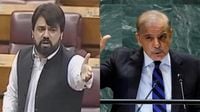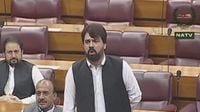On May 9, 2025, the Pakistan parliament became a battleground of intense debate as ministers clashed over the government's handling of escalating tensions with India. During a heated session, Pakistan MP Shahid Khattak, president of the Pakistan Tehreek-e-Insaf (PTI) in Khyber Pakhtunkhwa, did not hold back in his criticism of Prime Minister Shehbaz Sharif, labeling him a "coward" for his failure to make a strong statement against India and Prime Minister Narendra Modi.
Khattak expressed his frustration, stating, "Not even one statement came against India. Pakistani soldiers standing on the border expect that the government will fight bravely. When your leader is a buzdil (coward) who cannot even utter the name of Modi, what message are you giving to the soldier fighting on the border?" His remarks came in the wake of heightened military tensions following India's Operation Sindoor, which was launched in response to the deadly terror attacks in Pahalgam, Jammu and Kashmir, on April 22, 2025.
The operation, conducted on May 7, targeted nine terror facilities in Pakistan-occupied Kashmir (PoK), aiming to dismantle infrastructure linked to terrorist organizations like Lashkar-e-Taiba and Jaish-e-Mohammed. This military action was a direct response to the Pahalgam attacks that resulted in the deaths of 26 people, including a Nepali citizen, and marked a significant escalation in the ongoing conflict between the two nations.
As the situation unfolded, a video of Khattak's impassioned speech went viral on social media, further amplifying the discontent among the Pakistani populace regarding their leadership's response to the crisis. In the video, Khattak invoked a quote from Tipu Sultan: "If an army is led by a lion and consists of jackals, they will still fight like lions. But if an army of lions is led by a jackal, they can’t fight — they lose the war." His emotional outburst underscored the sentiments of many Pakistanis who feel their military is demoralized and unsupported.
Meanwhile, on May 8, Pakistan escalated tensions by launching drones and missiles into Indian airspace, targeting regions in Jammu and Kashmir, Punjab, and Rajasthan. However, these attacks were met with a robust response from India’s air defense systems, including the S-400 and Akash, which successfully intercepted all incoming threats. The Indian Army reported that it provided a "befitting" reply to Pakistan's aggression, reaffirming its commitment to safeguarding the nation's sovereignty.
In the Pakistani parliament, emotions ran high as MP Tahir Iqbal broke down in tears, pleading for divine intervention. "Ya Khuda, aaj bacha lo" (Oh God, save us today), he cried, reflecting the palpable fear and unease that has gripped the nation amid the escalating conflict. His emotional plea highlighted the desperation felt by many citizens who see the rising tensions as a direct threat to their safety and security.
The situation further deteriorated as the Pakistani military attempted to target various locations in India, including Awantipura, Srinagar, Jammu, and several cities in Punjab. This series of aggressive maneuvers by Pakistan has led to numerous ceasefire violations along the Line of Control, prompting swift responses from Indian forces.
In a statement, the Indian Army confirmed that they had effectively repulsed the drone attacks and reiterated their resolve to respond to any further provocations. The military's readiness to counter any threats underscores the seriousness of the current situation, which many analysts believe has reached a flashpoint.
The exchange of hostilities has not only intensified military confrontations but has also sparked a wave of criticism within Pakistan regarding the government's approach to the crisis. Observers note that the public's frustration with Prime Minister Sharif is palpable, especially as citizens express doubts about his leadership capabilities during such a critical period.
Social media has become a platform for citizens to voice their discontent. Many have taken to various platforms to mock Sharif's perceived weakness and lack of assertiveness in dealing with Modi. One user commented, "PM Shahbaz is looking underconfident and weak, it’s not a good look. Just saying," encapsulating the growing sentiment that the Prime Minister is failing to inspire confidence among the populace.
The ongoing conflict and the political fallout have raised concerns about the potential for further escalation. With both nations poised for action, the international community watches closely, hoping for a resolution that avoids further bloodshed.
As the situation develops, it remains to be seen how the Pakistani government will respond to the mounting pressure from its citizens and military, and whether Prime Minister Sharif can regain the trust of a nation that feels increasingly vulnerable and unsupported in the face of external threats.
The events of the past week have marked a significant chapter in the long-standing rivalry between India and Pakistan, with Operation Sindoor serving as a stark reminder of the fragile peace that exists between the two nuclear-armed neighbors. As both sides brace for the next moves, the hope for a diplomatic resolution hangs in the balance amidst the rising tide of nationalism and militarization.





